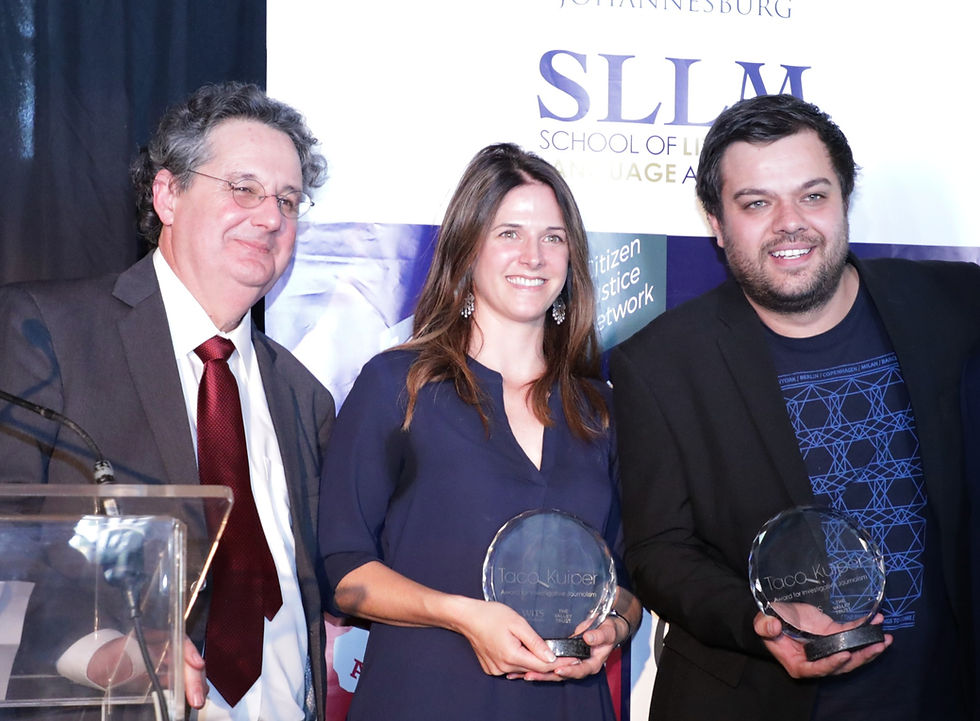Investigative journalism: 'We're stronger together'
- Jamaine Krige
- Apr 10, 2019
- 3 min read

Convener of the Taco Kuiper Awards, Anton Harber, with the winning investigative journalists Susan Comrie and Kyle Cowan. Pic: Tebogo Gantsa
Corruption, capture and disinformation are at the heart of many societal issues in South Africa, and it has often fallen on the media fraternity to uncover the rot. But this, according to Caxton Professor Anton Harber, is becoming more of a collaborative process than a competitive one between rival journalists and media houses.
“They have to work collectively and cooperatively,” said Harber, speaking to frayintermedia after the 2019 Taco Kuiper Investigative Journalism Award ceremony. “Yes, investigators compete with each other but they also depend on each other.”
According to him, some of the best, most impactful reporting the country has seen in recent years has been collaborative and cooperative. However, the industry needs more than just professional collaboration. There is also a need for camaraderie, to stand up and stand together when media freedom and the structures that ensure it come under threat.
“Journalists have to defend each other, and make sure that people out there know that if you go for one journalist, then the other journalists will support them and have their back,” he said. “If you try to stop one journalist from doing things, everyone else will step in to finish the job. That’s the kind of support and collaboration this industry needs.”
Media organisations and journalists must realise that in their efforts to uncover corruption, capture and disinformation, they are stronger working together than they are standing alone.
Kyle Cowan is an investigative journalist with Media24 and one of the joint-winners of the 2019 Taco Kuiper Award. He says he has come to realise the importance of having a network of peers, especially in a time when newsrooms are under so much strain.
“Investigative journalism, especially in the fast-paced news environment right now, is a lot more about collaboration than it was in the past. We need to work together a little bit more, and share our resources because our newsrooms are understaffed, underpaid and undervalued,” he said.
According to Cowan, “we need to band together to do better stories and bring better exposes” without compromising the integrity of the work.
Although he understands that profits matter and that current media models pose financial challenges for media organisations, he adds that the sooner media houses stop working against each other and start working together towards a greater good, the better.
Susan Comrie from amaBhungane was awarded joint first prize with Cowan. She agrees that now more than ever is the time for journalists to stand together. “I think particularly in the State Capture era, our collaborations have just became so much more crucial, because journalists were being attacked from all angles.”
This support is necessary when working on a big story, and having a network to call on makes the process more bearable. “The investigative journalists in this country - we all know each other and a lot of us have worked together at some point or another. Although the organisations that we work for are sometimes competing organisations, we see ourselves as a broader group of colleagues. A lot of the collaboration happens behind the scenes and it won't necessarily be that the story has five names on the byline, but you are able to call up former colleagues and ask about tip-offs that they had or stories that they worked on.”
Collaborative journalism has, in recent years, changed the political and social landscape of South Africa. The future of investigative journalism is one of cooperation, and media practitioners are discovering that to reach their common goal, they go further when going together.





Comments